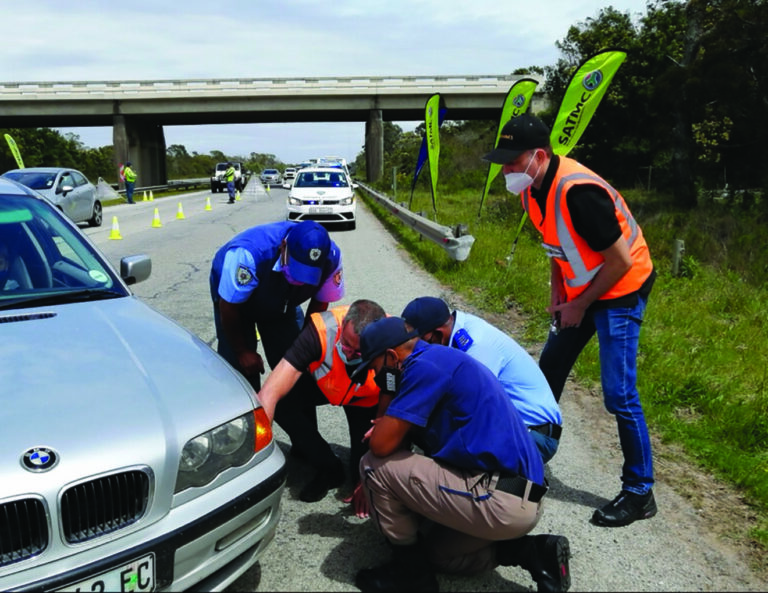The South African Tyre Manufacturers Conference (SATMC), in partnership with the Road Accident Fund (RAF), held a tyre safety workshop with law enforcement in Gqeberha late last year to reinforce South Africa’s tyre laws. The SAPS, Metro Police and other law enforcement personnel were in attendance. Following the workshop, a commuter educational roadblock was held on the N2 near Seaview Road exit, Gqeberha to educate consumers about the tyre laws and perform free tyre checks ahead of the festive season. “As holiday seasons approach, we see a significant increase in road accidents each year,” says William Maphutha from the Road Accident Fund. “Many of these could be avoided by ensuring one’s car is safe and roadworthy for travel.”
“Because tyres play a significant role in the safety of a vehicle, we’ve partnered with the RAF to educate and reinforce South Africa’s tyre laws by conducting these workshops and commuter educational roadblocks,” explains Nduduzo Chala, Managing Executive of the SATMC.
The tyre safety workshop was held at the Eastern Cape Provincial Department of Transport offices. The training was conducted by Lance Williams and David Van Der Merwe, both Technical Managers at Continental Tyres, and covered three key elements of tyre safety, listed below. Law enforcement then educated consumers on key safety elements and provided free tyre checks during a commuter roadblock held the next day. Here a tyre safety tips:
- Ensure your tyre pressure is correct
“Your tyres should always be inflated to the level indicated on the inside of the driver’s door. If there is no sticker on the door, you can usually find the specs in the owner’s manual,” explains Chala.
It is essential to check your tyres and know your recommended inflation levels so as not to overload your tyres.
- Underinflated tyres may cause tyre failure because of movement in the tyre sidewall.
- Overinflated tyres may decrease traction on the road, giving you a bouncy ride and a poor-handling car.
- Check that the tread depth is not less than 1.6 mm
“More tread means more grip, especially in wet conditions. It’s as simple as that,” says Chala. “Tread depth plays an essential role in vehicle control and braking distances. It is important to check the tread depth across the entire width of the tyre as the outer tread may be deeper than the inner,” he adds.
The tread depth can be checked with a dedicated tread gauge or by using the built-in Tread Wear Indicator (TWI) on your tyres. The TWI is a small rubber insert set at 1.6mm in the grooves of your tyre. Look for a small arrow on the tyre’s sidewall with the letters’ TWI’ to indicate where they are situated. They show how much of the tyre has already rubbed off and if the tyre is worn out. The tyre must be replaced if the tread is at the same level as the TWI.
- Second-hand tyre checks
“More than 60 per cent of second-hand tyres sold in South Africa are illegal,” says Chala. “Second-hand tyres are a cheaper alternative when replacing your car’s tyres, but due diligence needs to be taken to ensure that these tyres are, in fact, still roadworthy and safe to drive,” he adds.
A second-hand tyre is not safe to use when:
- The tread depth across any part of the tyre is level with the TWIs.
- There is no TWI due to carving the rubber on tyres to create more tread depth (regrooving).
- There is damaged rubber, including sidewall damage, bead damage and inner liner damage that exposes the fabric or cord.
- There are cuts, lumps, or bulges.
- You can see temporary solutions, such as tyre plugs, have been used.
“We appreciate the support of the RAF and the Eastern Cape law enforcement in educating consumers about tyre laws and the importance of tyre safety. Tyres are a safety-critical component in a vehicle. So we urge all motorists to check their tyres regularly and, if necessary, replace them with tyres from accredited/reputable tyre dealers. Having our consumers stay safe on the road during the festive season remains our top priority,” concludes Chala.
For more information on the SATMC and what they do, visit https://www.satmc.co.za/ or email info@satmc.co.za.

